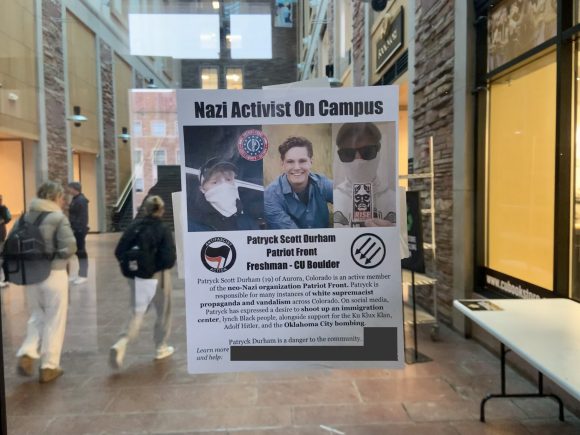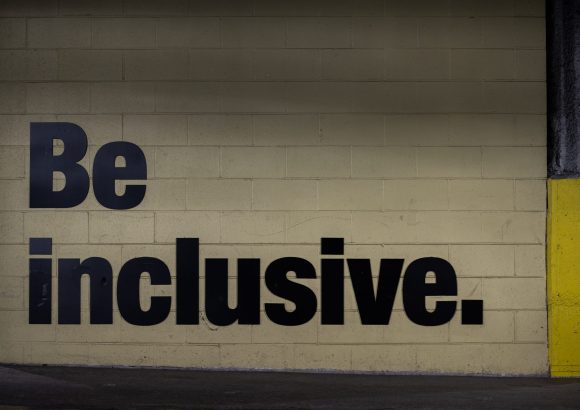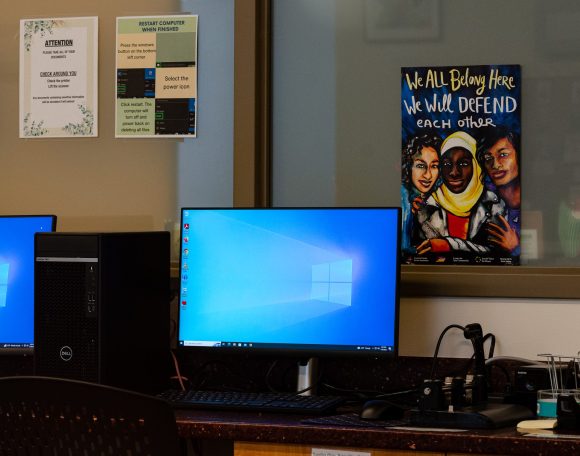
A poster of the CU Boulder student posted on the southern entrance to the UMC. (Jan. 26, 2023) (Henry Larson/CU Independent)
Editor’s note: This story contains descriptions of violence against marginalized groups. Those who may have experienced targeted harassment can contact the Office of Institutional Equity and Compliance and the University of Colorado Police Department. Students in need of additional support can contact the Office of Victims Assistance and Counseling and Psychiatric Services. If you feel directly threatened or are in danger, call 911.
On Jan. 26, students found flyers taped to the southern entrance of the University Memorial Center displaying a picture of a University of Colorado Boulder student. The flyers claimed the student is a member of white nationalist groups and has a history of violent language toward minorities.
The posters, created by the Colorado Springs Anti-Fascist group (COSA), were distributed by some members of CU Boulder’s Young Democratic Socialists of America (YDSA) chapter, although YDSA did not sanction the distribution.
The week prior, on Jan. 16, COSA published an article on its website with information alleging that the student, CU Boulder freshman Patryck Durham, was a member of the white supremacist group Patriot Front. They claim the student is a danger to the campus community, noting his participation in the hate group and his enthusiasm for the death of racial minorities.
According to the Anti-Defamation League, Patriot Front supports white nationalist, fascist and anti-semitic beliefs. The group, founded by participants of the 2017 “Unite the Right” rally in Charlottesville, Virginia, uses propaganda to distribute its hateful messages, according to the ADL. Group members are often seen in public wearing white balaclavas and baseball hats to cover their faces.
University officials were notified of Durham’s connection to Patriot Front and his violent social media posts before he stepped on campus as a student in August of 2022, according to Durham and other sources interviewed for this article.
CU Boulder policies and Colorado law prevent the university from considering certain disciplinary records when admitting students; however, their conduct is reviewed after admission. The university can prevent students from participating in campus life if they present an unreasonable risk to the university, according to university spokesperson Andrew Sorensen.

A sign in the CASE building parking lot. (Jan. 29, 2023) (Nathan Thompson/The Bold)
Present connections to white supremacy
In an interview with the CU Independent and The Bold, Durham confirmed his previous membership with Patriot Front and that he vandalized property. He also said he published social media posts encouraging the killing of immigrants and Black people.
“I’m not going to try and excuse or play away what I did, obviously,” Durham said. “I’m not going to apologize for it either. It’s just something that’s in the past for me.”
Durham did not definitively say whether he still held the violent beliefs that appeared in his social media posts, which were published in 2021.
“I can’t put an exact date on it because a lot of this stuff is messy. But it’s been, I think, a year or more by now,” since he was last affiliated with Patriot Front, Durham said.
Early Thursday morning, Jan. 26, several hours after Durham spoke with reporters for this story, the University of Colorado Police Department (CUPD) responded to reports of suspicious activity in Durham’s residence hall.
According to police records, officers found Durham with two people that police described as “older friends from Longmont,” just before 2 a.m. Durham failed to clarify to law enforcement how he knew the two individuals in his room, and witnesses told police they felt uncomfortable with the presence of Durham and the other adults.
One of the witnesses told police the pair of older adults were part of the white nationalist group Durham has been affiliated with. The two individuals were “told to leave the building” and did, according to police records.
According to the police report, witnesses also saw Patriot Front messages and propaganda on Durham’s laptop. Witnesses told police Durham was communicating with members of the hate group through the messaging app Telegram.
Sources who described the encounter to the CU Independent and The Bold did so on the condition of anonymity, as they were worried they would be harmed for coming forward.
People familiar with the incident said Durham returned to the dorms the next day, Jan. 27, to move out.
As of Monday, Jan. 30, Sorensen said Durham was no longer enrolled at the university. Sorensen said he was unable to comment on whether Durham chose to leave the university or was required to.
Prior knowledge of violent speech and Patriot Front membership
In May 2022, Durham was suspended from his Colorado high school and barred from walking at graduation after information about his affiliations surfaced online. Durham said his high school notified the university about this information.
A former classmate of Durham’s said at least one other person at the high school informed CU Boulder about his affiliations as well.
Due to fears of retaliation, sources familiar with this incident spoke with the CU Independent and The Bold on the condition of anonymity.
When the individual reached out to the university about Durham’s ties in July 2022, they were contacted by a representative from the Office of Institutional Equity and Compliance (OIEC).
This individual said that the university representative informed them that since Durham had not targeted a member of a protected class, they would not be able to pursue the case further. The representative added they would also only be able to investigate the complaint if Durham’s conduct impacted the learning environment on campus.
CU Boulder policy prohibits discrimination and harassment on the basis of protected-class status.
While Sorensen answered questions about the process the university employs when investigating student conduct, he stated repeatedly that CU Boulder does not discuss specific cases.
The university’s Conduct Review Committee (CRC) oversees the process of reviewing disciplinary and criminal history when new students are admitted to CU Boulder.
Under a 2019 Colorado law, the university cannot ask applicants about their disciplinary or criminal records before they’re admitted to the university, except for the most extreme criminal convictions, including sexual assault, kidnapping or murder.
However, typically once a student is admitted – and before they arrive on campus – the university inquires into their full disciplinary and criminal record in order to see if they can participate in campus life.
In Durham’s case, he said officials were concerned with his violent social media posts.
Durham’s social media posts from as recent as May 2021 include a reference to shooting up an immigration center and encouraging hanging Black people.
Under the law, hate speech is considered protected speech and cannot be shut down, according to the ADL. However, the organization says hate speech may cross the line into unprotected speech in certain cases, such as true threats, harassment or incitement of imminent illegal activity.
Durham said he met with the review board during the summer of 2022, after most first-year students had been admitted for the fall semester. During the meeting, the committee discussed whether he presented a threat to campus.
Durham said the committee “kind of understood that I wasn’t going to go out and harm people or menace the student population.”
Among other considerations, the review board typically looks at the type and severity of the reported conduct, how much time has passed since the incidents, any evidence of rehabilitation and how beneficial participating in campus life would be to the applicant.
If the committee finds the applicant poses an “unreasonable risk to the safety or security of others in campus life,” it can restrict their access to university housing and campus events, or revoke it entirely.
As a condition of the review process, Durham said he was required to meet with a psychiatric doctor on multiple occasions throughout the fall semester in order to maintain his status at the university.
Sorensen said the university does not generally consider consultations with a psychiatric doctor to be a condition for participation in campus life.
Both CUPD and university officials are aware of Durham’s actions.
“CUPD is aware of the situation, a report has been filed and we are working with the student and campus partners,” said Christine Mahoney, the university police department’s spokesperson, in an email statement sent on Jan. 25.
Sorensen said when CU Boulder “becomes aware of reports of concerning student behaviors, the Office of Institutional Equity and Compliance and Student Conduct and Conflict Resolution address those concerns, which in some cases may also involve reporting to the CU Boulder Police Department.”

A sign is posted behind a monitor on campus. (Jan 29, 2023) (Nathan Thompson/The Bold)
“Standing together”
Marginalized students have expressed concern about what Durham’s presence on campus means for their communities going forward. Members of CU Boulder Hillel and UMAS y MECHA, two organizations that offer community and resources to students from marginalized communities, have come forward.
CU Boulder has around 2,500 Jewish students, according to CU Boulder Hillel’s website. Hillel is a student organization that provides space and a sense of community for Jewish students on campus.
Matthew Weiner, a member of Hillel, said the Jewish community at the university is “fragile yet resilient.”
He said he was not surprised when he first learned about Durham, but he is concerned that the university allowed him on campus despite knowing about his beliefs.
“It disheartens me that the university would put profits over community for another tuition check,” Weiner said. “That really is disheartening.”
Crisol Corral-Guzman, a first-generation immigrant and student at the university, said she first learned about Durham through social media posts warning students about his presence on campus.
“I don’t feel safe on my own campus — on a campus that I worked so hard to get to,” she said.
Corral-Guzman said she felt as though the university needs to do more to protect marginalized communities from threats of harm.
“The school can’t continue to promote itself as an inclusive and diverse school and continue to do that for just a PR stunt when they have students that are obviously going completely against what the school stands for,” Corral-Guzman said.
UMAS y MECHA is a student group on campus that supports Chicano and Latino students, many of whom are immigrants or first-generation students. The organization’s leaders shared information about Durham with its members, encouraging them to be careful around campus.
“My first reaction was kind of shocked but also scared,” said Brittany Gutierrez Zacarias, the events coordinator for the group.
Casy Vega, a member of UMAS y MECHA, said she questioned wanting to be on campus after she heard about the allegations.
“I felt a lot of anxiety,” she said. “I [began to ask myself], ‘Do I even want to be on campus that much? Do I even want to show off these special parts of myself that I really like or represent my Chicana side openly to everyone?’”
In the wake of this situation, Gutierrez Zacarias said she hopes that students of color will come together to feel safe.
“There’s a lot of power in us standing and working together to reach a goal of having space on campus for everyone,” she said.
Sorensen declined to say whether the university would be reevaluating its admission policies in the wake of this case.
Multiple reporters from the CU Independent and The Bold contributed to this story.
Contact CU Independent Editor-in-Chief Henry Larson at henry.larson@colorado.edu.
Contact The Bold Editor-in-Chief Suvu Singh at shubhashika.singh@colorado.edu.
